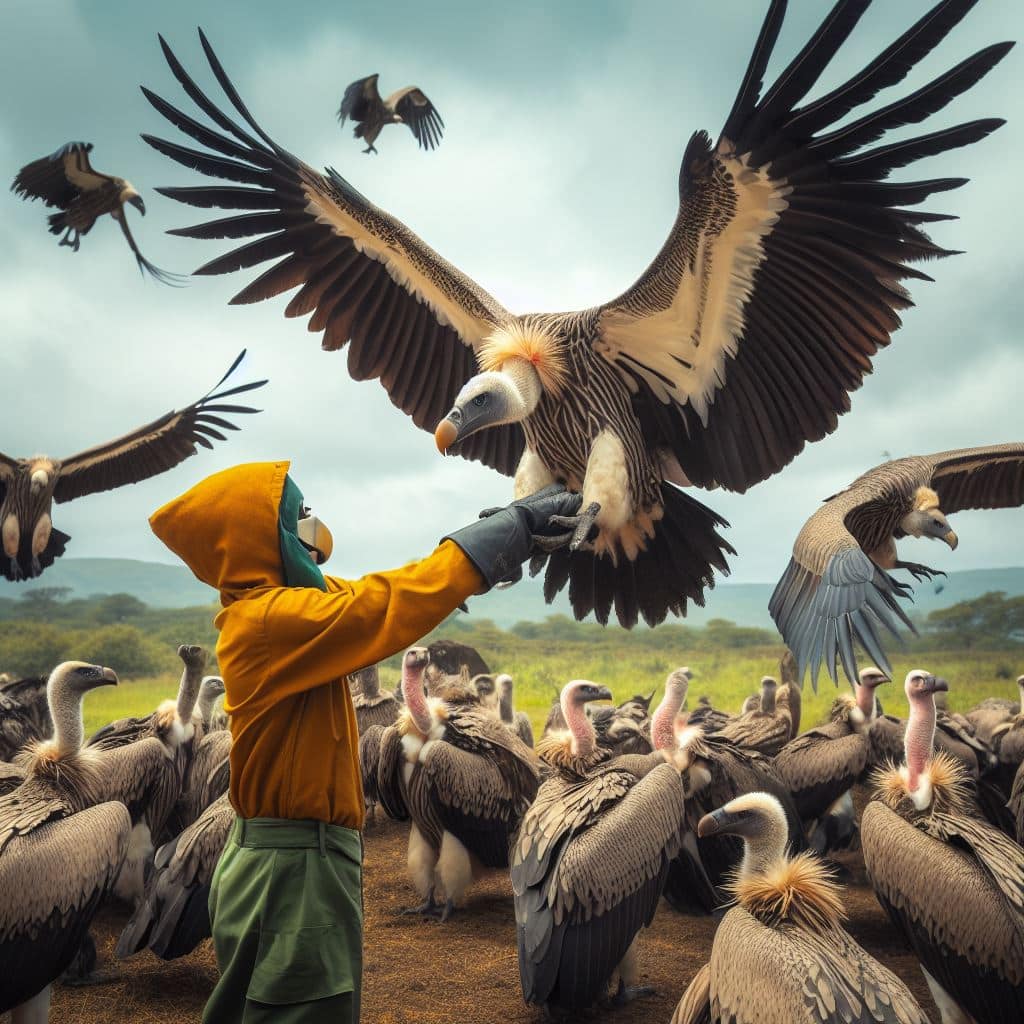Vultures, often overlooked and sometimes even detested for their appearance and scavenging habits, play a pivotal role in maintaining the balance of our ecosystem.
As nature’s cleanup crew, they efficiently dispose of carcasses, preventing the spread of diseases and helping in the decomposition process. However, these unsung heroes of the animal kingdom are facing severe threats, especially in Africa.

Human activities, misconceptions, and a general lack of awareness about their significance have pushed several vulture species to the brink of extinction.
For The Love Of Vultures Article Answers
| Question | Answer |
|---|---|
| The best alternate headline for this article would be __________. | Decline in African Vultures Could Result in Their Extinction |
| In light of the main ideas of this article, what caused Masumi Gudka, a Kenya-based vulture conservationist, to make such a public statement? | Although vultures play an important role in their ecosystems, many people are reluctant to care about animals that they consider unattractive. |
| Which is the closest synonym for the word innovative? | Inventive |
| Suppose Noor wants to find out more about different kinds of wildlife in Kenya. She would find most of her information _________. | By conducting an interview with Ben Mugambi, a tour company operator |
| The reader can infer from the article that __________. | The decline in seven African vulture species is largely due to human activity. |
| Which would be the closest synonym for the word detested? | Disliked |
| Which of these is most important to include in a summary of this article? | Without help, more than half of the vulture species living in Africa could disappear. |
| Which statement from the article best supports the belief it may take some convincing to get the public interested in saving vultures? | Long detested for their lack of, well, cuteness, and for the fact that they eat animal carcasses, many, vulture species are now under threat. |
The Plight of African Vultures
Africa, a continent rich in biodiversity, is witnessing a concerning decline in its vulture population. Seven of its vulture species are experiencing a rapid decrease in numbers, with some even teetering on the brink of extinction.
These birds, often seen circling the skies or scavenging on the ground, play a crucial role in maintaining the health of the environment by efficiently disposing of carcasses.
However, human activities have become the primary threat to their survival. From direct poisoning, where carcasses are laced with toxic substances to kill predators but end up killing vultures, to habitat loss due to urbanization and infrastructure development, the challenges are manifold. Additionally, vultures are often hunted for their body parts, which are used in traditional medicine and cultural rituals.
Collisions with wind turbines and electrocution from power lines further add to their mortality rates. The decline in vulture numbers is not just an ecological concern but also poses a threat to public health, as the absence of these natural scavengers can lead to an increase in rotting carcasses, which in turn can become breeding grounds for diseases.
Vocabulary
| Word | Description |
|---|---|
| species | a group of closely related organisms that can have offspring |
| endangered | a species that could disappear |
| conservationist | a person who works to keep animals, plants and natural areas safe |
| ecosystem | all of the living and non-living things that act together in an environment |
| extinct | no longer existing or living |
| culture | the beliefs or way of life of a group of people |
| environment | everything that surrounds a living thing |
| refuge | a place of safety |
- Species: A group of closely related organisms that can reproduce and have offspring. For example, the African White-backed vulture is a species of vulture facing threats in its natural habitat.
- Endangered: Refers to a species that is at serious risk of becoming extinct in the near future. Due to human activities and other factors, many vulture species in Africa are now classified as endangered.
- Conservationist: A person dedicated to preserving and protecting the natural environment, wildlife, or historical sites. Masumi Gudka, mentioned in the article, is a conservationist working to raise awareness about the importance of vultures.
- Ecosystem: A community of living organisms (plants, animals, and microbes) interacting with each other and their non-living surroundings (air, water, soil). Vultures play a crucial role in the ecosystem by cleaning up carcasses and preventing the spread of diseases.
- Extinct: Refers to a species that no longer exists anywhere on Earth. Conservationists are working hard to ensure that vultures and other endangered species do not become extinct.
- Culture: The beliefs, customs, arts, and way of life of a particular group of people. Different cultures may have varying perceptions and beliefs about vultures and their significance.
- Environment: The surroundings or conditions in which a person, animal, or plant lives and operates. The decline in vulture populations is a concerning indicator of the health of our environment.
- Refuge: A place that provides shelter or protection. Conservationists are creating vulture safe zones, which act as refuges where these birds are protected from threats.
Masumi Gudka’s Advocacy
Masumi Gudka, a dedicated vulture conservationist based in Kenya, has taken it upon herself to champion the cause of these misunderstood birds. Recognizing the vital role vultures play in the ecosystem, Gudka has been at the forefront of efforts to raise awareness about their declining numbers and the urgent need for conservation measures.
However, advocating for vultures comes with its unique set of challenges. Unlike charismatic megafauna like elephants or lions, vultures often don’t evoke the same level of sympathy or interest from the general public.
Their appearance, often described as “lacking cuteness,” coupled with their scavenging nature, has led to a widespread negative perception. This long-standing detestation has made it difficult for conservationists to garner support for their protection.
But Gudka is undeterred. Through innovative campaigns, educational programs, and public engagements, she aims to shift the narrative around vultures. By highlighting their importance in maintaining a balanced ecosystem and their role in preventing the spread of diseases, Gudka hopes to change hearts and minds, ensuring that these essential birds receive the attention and protection they so desperately need.
The Role of Vultures in the Ecosystem
Vultures, often referred to as nature’s clean-up crew, play an indispensable role in maintaining the health and balance of our ecosystems. These birds are scavengers, feeding primarily on the carcasses of dead animals. By doing so, they perform a crucial service that often goes unnoticed and underappreciated.
- Natural Waste Management: Vultures efficiently consume carcasses, ensuring that dead animals do not lie around for long. This rapid removal of organic waste helps in reducing the spread of diseases and prevents the proliferation of other scavengers that might not be as efficient or sanitary as vultures.
- Disease Control: By feeding on carcasses, vultures prevent the spread of certain diseases. Their highly acidic stomachs can digest pathogens that would be lethal to other animals. This means they can consume rotten meat and effectively neutralize diseases like anthrax, rabies, and tuberculosis, preventing them from entering the food chain.
- Balancing the Ecosystem: Vultures help in controlling the population of other scavengers. Without vultures, there would be an increase in the number of scavengers like rats and wild dogs, which could lead to an imbalance in the ecosystem. These animals, unlike vultures, can be vectors for diseases that affect humans.
- Indicator of Environmental Health: The health of vulture populations can be an indicator of the overall health of an ecosystem. A decline in their numbers can signal a problem in the environment, such as poisoning or other threats.
The potential extinction of vultures would have dire consequences for the environment. Without these efficient scavengers, carcasses would take longer to decompose, leading to an increase in disease spread.
Moreover, the imbalance created in the ecosystem could have cascading effects, affecting other wildlife and even human populations. It’s clear that the survival of vultures is not just about protecting one species but ensuring the health and balance of our entire ecosystem.
Conservation Efforts
The decline in vulture populations, largely due to human activities, has necessitated urgent conservation efforts to prevent their extinction. These magnificent birds, despite their often negative portrayal, are crucial for the health of our ecosystems.
Recognizing this, conservationists are employing innovative approaches to protect and revive vulture populations.
- Awareness Campaigns: Conservationists, like Masumi Gudka, are working tirelessly to change the public’s perception of vultures. Through educational programs, workshops, and media campaigns, they aim to highlight the importance of vultures in the ecosystem and dispel myths surrounding them.
- Vulture Safe Zones: These are designated areas where efforts are made to eliminate the threats faced by vultures. This includes reducing the use of toxic chemicals and drugs that harm vultures when they consume contaminated carcasses.
- Breeding Programs: In areas where vulture populations have drastically reduced, conservationists are setting up captive breeding programs. These programs aim to breed vultures in a controlled environment and release them into the wild, bolstering their numbers.
- Legislation and Policy Changes: Advocacy for stricter regulations on the use of harmful chemicals and drugs, like diclofenac, which is toxic to vultures, is ongoing. By lobbying for policy changes, conservationists hope to reduce the unintentional poisoning of vultures.
- Community Engagement: Engaging local communities is crucial. By educating them about the importance of vultures and training them in vulture-friendly practices, conservationists aim to create a grassroots movement for vulture conservation.
- Research and Monitoring: Continuous research is being conducted to understand the challenges faced by vultures better. This includes tracking their migration patterns, studying their habits, and monitoring their numbers. Such research helps in devising effective conservation strategies.
The success of these conservation efforts largely depends on public support. The more people understand and appreciate the role of vultures in our environment, the more likely they are to support initiatives aimed at protecting them.
Every individual can play a part, be it through donations, volunteering, or simply spreading awareness. Together, we can ensure that vultures continue to soar in our skies, playing their vital role in the ecosystem.
Additional Resources
- BirdLife International – birdlife.org – A global partnership of conservation organizations that strives to conserve birds, their habitats, and global biodiversity.
- “The Book of Vultures and Condors” by Jose Hernan Sarasola – A detailed guide to the species of vultures and condors, their habitats, and their roles in the ecosystem.



